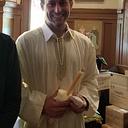Thoughts on Notre Dame
Every once in a while, an event comes along in history that illuminates a great deal about people by their reactions to it. The 2019 fire that consumed much of the Cathedral of Notre Dame is probably one of the most stark examples of this in a long time. As someone who has been a student of history practically since I could read, seeing the news of the news of the fire pop onto my computer and then reading about the full extent of the damage was a gut blow on a level that is hard to describe. A good comparison might be the way some of the music afficionados in my life reacted to the death of David Bowie or Prince (which is not to say they weren’t affected by Notre Dame too, or that I wasn’t sad when Bowie or Prince died).
Notre Dame was one of the most incredible pieces of living history on the planet, and, as the stone structure and some of the reliquary survived, so it will remain. More of it will be restored, surely. But it will still be a loss of living history the likes of which has rarely been seen in the post World War II world. One of the examples that comes the closest during my lifetime was the destruction of the 1,700 year old Bamyan Buddha statues by the Afghan Taliban in March 2001. But I only learned about that years after it happened, and as much as I find it a tragic event in intellectual hindsight, it didn’t have a visceral impact on me.
What hit closer to home was reading about some of the destruction of ancient artifacts and culture by ISIS terrorists since they arose in 2014, most prominently the Tomb of Jonah. For one thing, I learned about those in real time, so the impact of them was more immediate. I also understood, being conscious of being a part of the heritage of the Abrahamic peoples, that this was more directly connected to my own history, my ancestry. But even there, I didn’t know what the Tomb of Jonah looked like, I hadn’t been to see it with my own eyes.
Notre Dame, on the other hand, is a part of both my ancestral heritage (through my father’s Catholic roots, and, one could argue, even the broader Judeo-Christian tradition itself), and the French culture that I adopted through my education from an earlier age. I visited it during the many trips to France that I undertook during my school days; while I would like to say that those memories remain as clear as day, the truth is that that is not the case. I most vividly remember the outside of it, how it hung over the city of Paris and imposed over it, while having some more vague memories of the stained glass windows and architectural details within.
I have to admit that it was only now, with the knowledge that much of what I saw at Notre Dame is gone, that I experience these memories more clearly. What does it take to bring experiences, even ones that were potent when we first underwent them, into sharpest relief? Maybe it is the sense that those experiences are finite, that we can no longer take them for granted, that makes us really appreciate them.
Over the past few days I have reflected more on the experiences of unique wonder and beauty that I have witnessed in my life. These can be man-made, such as the red rock city of Petra, or natural, such as Utah’s Zion Canyon. I dread the idea of not having the ability to revisit these places or re-experience them, even though it is quite possible I will only see Petra once. I might never have gone back to Notre Dame even (though I think I would have). But it was the closing off of possibility that made me feel the pain I felt when I was saddened by the cathedral burning. But an aspect of that heightened sensation made me feel what I had more strongly, which ultimately is the other side of loss, in that it causes of to preserve what is left all the more.
